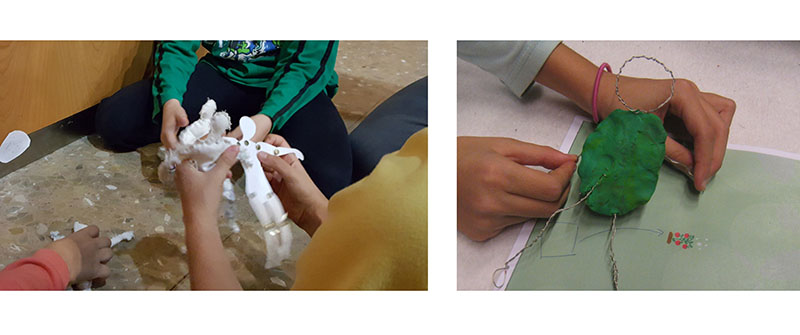
EcoSystem Project is a learning environment based on Full-Body Interaction aimed at supporting children’s understanding of environmental issues related to air pollution. It is part of the Evaluation-Driven Design approach which focuses on design and evaluation strategies for Full-Body Interaction. The approach supports researchers in the analysis of situated interpretations made by children. These interpretations are used to guide and optimise an iterative process of design and assessment. Specifically, I investigated in the project two different ways of involving children in the design process.
- The Intuitive Actions Elicitation Technique is based on requiring participants to invent and perform physical actions related to specific activities during the interactive experience, using a mid-tech Wizard of Oz prototype of a Full-Body Interaction Learning Environment.

- The Puppet-Based Design Technique is based on using flexible anthropomorphic puppets to allow children designing specific physical actions for a Full-Body Interaction Learning Environment.

Details about the design process of the learning environment can be found in the following publications.
Participatory Design Methods
Marie-Monique Schaper, Laura Malinverni, and Narcis Pares. (2015). Sketching through the body: child-generated gestures in Full-Body Interaction Design. In Proceedings of the 14th International Conference on Interaction Design and Children (IDC ’15). ACM, New York, NY, USA, 255-258. DOI=http://dx.doi.org/10.1145/2771839.2771890
See conference poster IDC’15
Marie-Monique Schaper, Laura Malinverni, and Narcis Pares. (2014). Participatory design methods to define educational goals for full-body interaction. In Proceedings of the 11th Conference on Advances in Computer Entertainment Technology (ACE ’14). ACM, New York, NY, USA, Article 50. DOI=http://dx.doi.org/10.1145/2663806.2663867
See conference poster ACE’14
Evaluation-Driven Approach
Laura Malinverni, Marie-Monique Schaper and Narcis Pares. (2016). An evaluation-driven design approach to develop learning environments based on full-body interaction. Educational Technology Research and Development. DOI=http://dx.doi:10.1007/s11423-016-9468-z